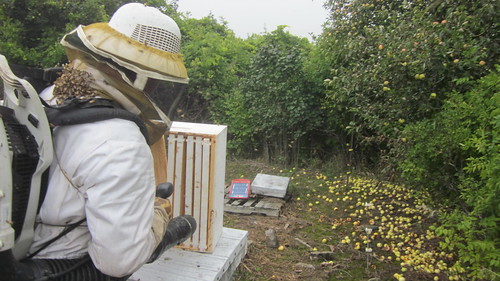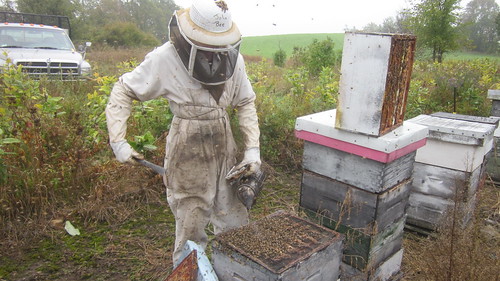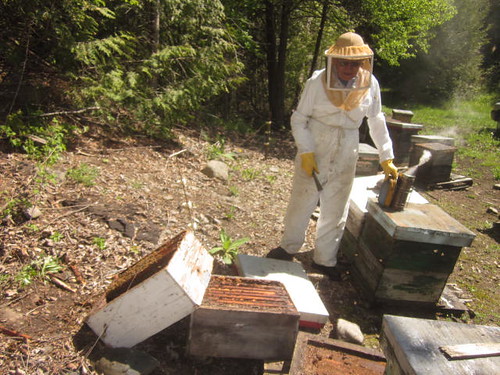-
Robert Campbell
- Toronto, Ontario
- Canada
- Blog Posts (4)
- Discussions (2)
- Events
- Groups
- Photos (7)
- Photo Albums (1)
- Videos
Robert Campbell's Discussions
Photos from 2017 Northumberland Beef Farmers BBQ in Dartford, Ont, 06 July
1 Reply
Hey readers and beef farming enthusiasts, here are photos from annual Northumberland Beef Farmers BBQ which was held this year on Ryan Campbell's farm in Dartford, Ontario - 06 July 2017…Continue
Tags: event, farm, equipment, photos, annual
Started this discussion. Last reply by Chris RAlph May 29, 2018.
WANTED: pictures of barns missing boards for a story on thieves
I need pictures of old barns missing boards and stories about cedar fence rail thieves and barn board thieves - do they ever get caught?Have you personally lost fence rails? barn boards? or caught…Continue
Tags: Ontario, architectural, wood, Toronto, restaurant
Started Jun 15, 2015
Robert Campbell's Page
Profile Information
- How are you involved in agriculture?
- Farm Livestock, Agri-Business
Canadian Beekeeper in Ontario
Here's Johnny Bee Good in a beeyard near Hastings Ontario in August 2011 making ready with his hive tool to remove the queen excluder, which is a metal screen that restricts the queen to the brood chambers below. This keeps eggs out of the honey supers above - you can see the super has been removed and now sits upright beside Johnny. I wrote about the 2011 honey harvest was near crop failure, on Son of a Beekeeper , my Tumblr blog.
Robert Campbell's Photos
Robert Campbell's Blog
Ontario Beekeepers Prize Pungent Buckwheat Honey
 After spending time with another local beekeeper and helping harvest his annual summer honey crop this son of a beekeeper has become even more acutely aware of the various honey regions that are waiting to be discovered by North American kitchens , across the province of Ontario.
After spending time with another local beekeeper and helping harvest his annual summer honey crop this son of a beekeeper has become even more acutely aware of the various honey regions that are waiting to be discovered by North American kitchens , across the province of Ontario.
One such naturally occurring region is the wild buckwheat fields in northeastern Ontario, above hwy 7 on…
ContinuePosted on September 1, 2012 at 3:00pm — 1 Comment
New Holland 658, Baling Hay in Ontario Canada
Talk about 'making hay while the sun shines'. Here's a short video I shot on Saturday June 16th 2012 of my nephew Ryan baling hay with his New Holland 658 hay baler. The grass feed is a mixture of alfalfa, red clover and timothy and as such will make excellent feed for the growing numbers of cows on their feedlots.
I can remember harvesting the hay in this field in the 1970s and 80s - we used to walk behind the tractor and wagon and pitch 80 lbs bales onto the wagon…
ContinuePosted on June 17, 2012 at 2:36am
Black Bears Strike But Are Repelled By Electric Fences In Ontario Beeyards
Some black bears did launch an attack on of our remote beeyards last week!
This is what bear damage looks like, and it could have been a lot worse. The total loss was only four frames of brood. And that's because this beeyard, like all of our locations in southern Ontario, is protected by a heavy duty solar fencer.
Its unlikely the hive blew over in the wind - in the…
ContinuePosted on May 13, 2012 at 1:49pm — 1 Comment
Son of a Beekeeper Blog on Ontario Agriculture Network
 Hello from Rob Campbell the original Son of a Beekeeper in Ontario Canada.
Hello from Rob Campbell the original Son of a Beekeeper in Ontario Canada.
I hope to keep a blog presence here on the Ontario Agricultural network to keep readers updated on the latest challenges facing Canadian beekeepers. Because I have the good fortune of living near and helping out my family's…
ContinuePosted on April 15, 2012 at 4:50am — 1 Comment
© 2025 Created by Darren Marsland.
Powered by
![]()


Comment Wall
You need to be a member of Ontario Agriculture to add comments!
Join Ontario Agriculture